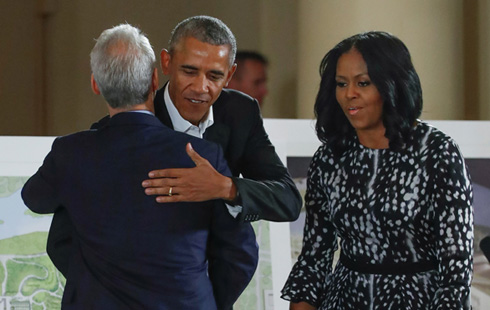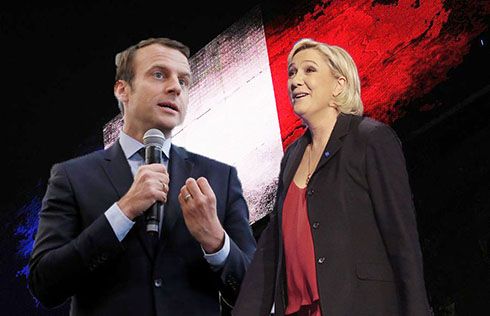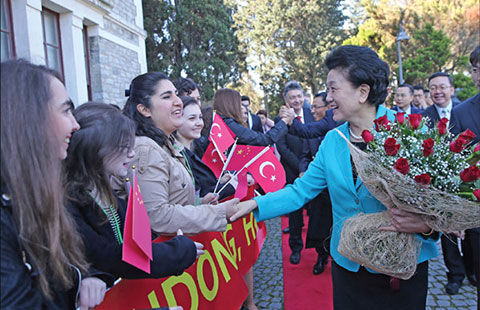Le Pen struggles to damage Macron before French presidential election
He called her the priestess of fear and a liar who would bring civil war to France. She called him a privileged and cold investment banker who was a friend of Islamists. The discussion in Wednesday's French presidential debate was personal and scrappy and rarely dealt with matters of policy.
|
 |
|
Civil servants prepare electoral documents for the upcoming second round of 2017 French presidential election as registered voters will receive an envelope containing the declarations of faith of each candidate, Emmanuel Macron (R) and Marine Le Pen along with the two ballot papers for the May 7 second round of the French presidential election, in Nice, France, May 3, 2017. [Photo/Agencies] |
Extreme right-wing candidate Marine Le Pen needed to damage centrist Emmanuel Macron in the key encounter between the candidates before Sunday's final vote, in which France will chose its next president. The debate was a stalemate and Macron retains his 60:40 lead, according to French opinion polls.
But Le Pen will enter the last days of campaigning unbowed. Opinion polls did not predict the success of Brexit in the United Kingdom, or Donald Trump winning the presidency in the United States, and Le Pen is the French partner of those projects. If there is an undercurrent of anti-establishment feeling that has not been reflected by the polls, Le Pen will be the beneficiary.
The political atmosphere in the Western hemisphere is conducive to a Le Pen win. The UK's decision to leave the European Union and Donald Trump's victory showed that anti-immigration and anti-globalization rhetoric can win elections.
But the French two-round voting system is different. It allows voters the chance to gang up on an extremist candidate, as happened to Le Pen's father in 2002 when he got 17.8 percent of the vote in the second round of the presidential elections.
Le Pen is doing everything she can to avoid her father's fate and she is on track to more than double the percentage of votes he received. Even in defeat, she will claim victory.
Le Pen's strategy has been to emphasize the difference between the two candidates. She will protect French jobs, while Macron will give them away by supporting globalization. She will reject immigrants. Macron will embrace them.
Days after the first round of voting, Le Pen got a chance to portray herself as the candidate of the shop floor and Macron as the candidate of the boardroom when Macron visited a manufacturing plant in his home town of Amiens. As he spoke to union leaders in the company offices, Le Pen rushed to the plant's shop floor to assure the workers that if she was elected they would all keep her jobs.
Macron continued to the shop floor. While Le Pen was cheered, he was jeered but he stood his ground and told the workers that he could not guarantee their jobs, but that, if the plant was closed, there would be government support to cushion the blow and provide retraining.
Le Pen has also tried to appeal to as many of her first-round opponents as possible. On Monday, she tried to attract the supporters of the defeated center-right candidate Francois Fillon, by delivering a speech that was, in parts, almost identical to one he had made in April.
In the first round, 49 percent of voters supported an anti-EU candidate, so Le Pen has tried to engage those voters, while downplaying her antipathy toward the EU and the euro to others.
Macron's greatest advantage is the reputation of the National Front, Le Pen's party. Le Pen has tried to modernize it and extract it from its associations with anti-Semitism, racism and sympathy for the Nazis, but this has proved difficult. She resigned her leadership of the party to focus on the presidential campaign but it quickly emerged that Jean-Francois Jalkh, her replacement, had made comments that questioned whether the Holocaust had happened. Jalkh resigned but the National Front's connection to France's enemies was highlighted.
Macron worked to emphasize what Le Pen is trying to obscure. On Monday, he commemorated the murder of a Moroccan man thrown in the River Seine during a Front rally in 1995. On Tuesday, he visited the town of Oradour-sur-Glane, where German soldiers killed 642 civilians in 1944.
The French electoral system is designed to favor centrist candidates such as Macron. Voters will choose him because they dislike Le Pen more. If the polls are correct, only a major event, a damaging leak or a terrorist attack will propel Le Pen to the Elysee Palace.
But if she does win, international stock exchanges and money markets will go crazy and the crisis in the EU precipitated by Brexit will be infinitely greater.




















